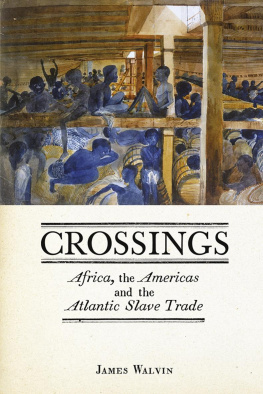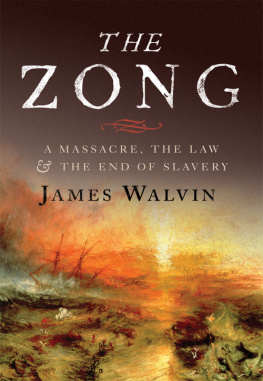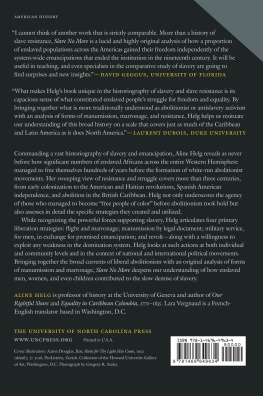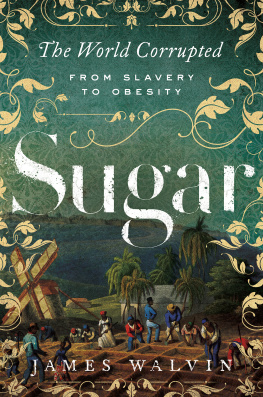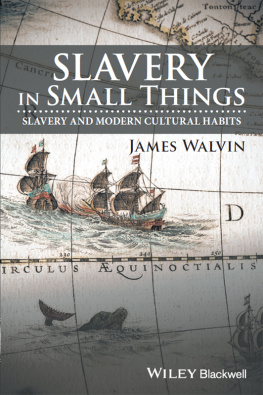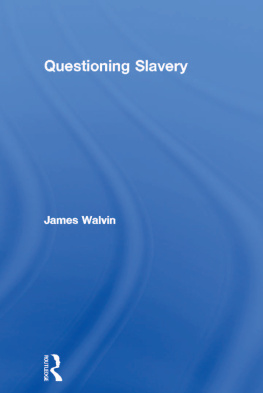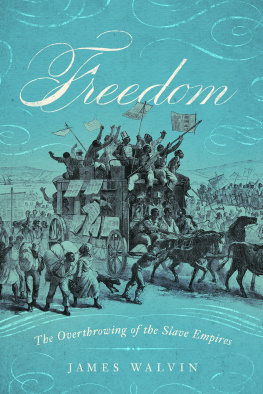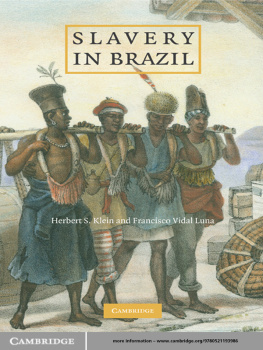Contents
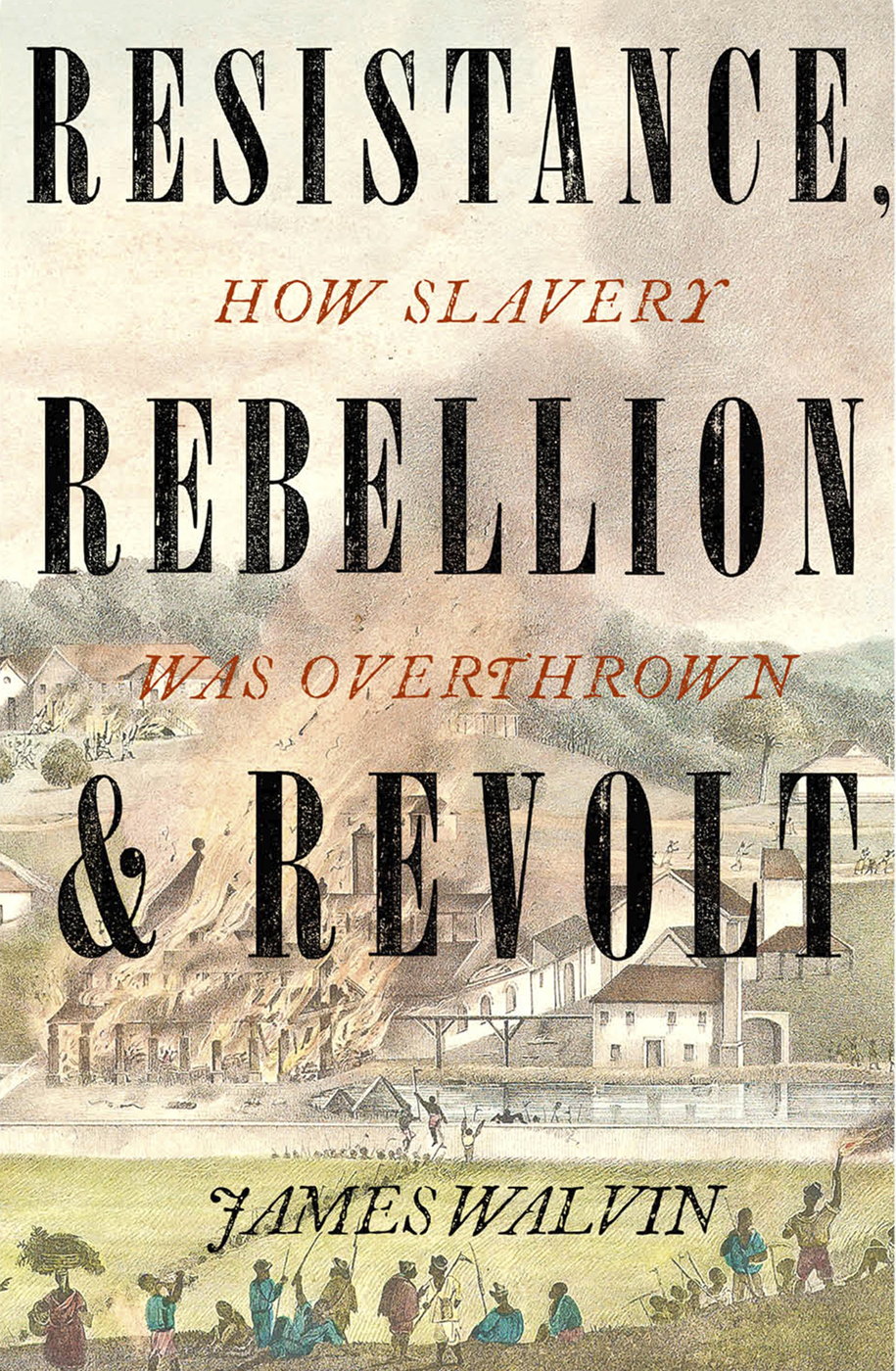
Published by Robinson
ISBN: 978-1-47214-144-6
Copyright James Walvin, 2019
The moral right of the author has been asserted.
All rights reserved. No part of this publication may be reproduced, stored in a retrieval system, or transmitted, in any form or by any means, without the prior permission in writing of the publisher.
The publisher is not responsible for websites (or their content) that are not owned by the publisher.
Robinson
Little, Brown Book Group
Carmelite House
50 Victoria Embankment
London EC4Y 0DZ
www.littlebrown.co.uk
www.hachette.co.uk
James Walvin is the author of many books on slavery and modern social history. His book, Crossings, was published by Reaktion Books in 2013. His first book, with Michael Craton, was a detailed study of a sugar plantation: A Jamaican Plantation, Worthy Park, 16701970 (Toronto, 1970). He became a Fellow of the Royal Society of Literature in 2006, and in 2008 was awarded an OBE for services to scholarship.
Slavery in Small Things: Slavery and Modern Cultural Habits
Different Times: Growing Up in Post-War England
Crossings: Africa, the Americas and the Atlantic Slave Trade
The Zong: A Massacre, the Law and the End of Slavery
The Trader, The Owner, The Slave:
Parallel Lives in the Age of Slavery
Atlas of Slavery
Black Ivory: Slavery in the British Empire
Questioning Slavery
An Africans Life:
The Life and Times of Olaudah Equiano, 17451797
Making the Black Atlantic: Britain and the African Diaspora
How Sugar Corrupted the World: From Slavery to Obesity
For Byron Criddle, a friend of fifty-eight years.

O N THE EVE of the French Revolution, all of Europes major maritime powers, and a number of thriving colonies in the Americas, were keen to have a share of the transatlantic business of slavery. Shipping Africans to the Americas and using them (and their offspring) to labour mainly in agricultural work was a lucrative concern, which no one seemed able to resist. A century later, those same nations had banned the slave trade, had freed all their former slaves and were now vehemently opposed to slavery. Not only was their antipathy expressed in the upper echelons of power (in formal politics, government and diplomacy) but it had also caught the imagination of millions of ordinary people: people who were increasingly well informed via the explosion of literacy and the world of cheap print. To make the point more crudely: in the late eighteenth century, most Atlantic slave owners and slave traders felt confident that they could ride out any criticism of slavery; by the late nineteenth century, they had all vanished and only an eccentric would have felt confident to defend slavery publicly in the West.
* * *
At its height, the Atlantic slave system formed a massive international industry that linked Europe, Africa and the Americas. For all its crude violence, it was a finely tuned commercial enterprise that generated prosperity at all points of the Atlantic compass (and beyond). It was a matter of major commercial and strategic concern for all of Europes maritime powers, and for the emergent economies of the Americas. Equally, it became a source of economic importance in Africa itself, to the merchants, traders and heads of state who pandered to the demands of the slave ships. From the earliest days when Iberians shipped Africans to Spain and Portugal, to the last days of the trade to Brazil and Cuba, it was a commerce that attracted entrepreneurs and speculators (both large and small) and it seduced governments who were keen to enhance their nations power, wealth and status. But slavery was a commercial system fraught with human and natural dangers. European powers fought each other for slave colonies, for essential trading posts on both sides of the Atlantic and for control of the shipping routes that bound the system together. In addition to the great risks of oceanic travel and settlement, Europes slaving powers faced the unavoidable dangers of African diseases and the threats posed by their maritime and strategic rivals. Above all, however, all faced the inescapable dangers posed by the slaves themselves.
Europes Atlantic trade scattered millions of enslaved Africans across the Americas. From the Chesapeake Bay to the River Plate, a string of American colonies disgorged a host of lucrative commodities (sugar and rum, tobacco and cotton, coffee, timber and many others), which transformed the taste and consumption habits of millions of people. In the process, new economies emerged in Europe, Africa and the Americas. The entire system rested on the Africans, taken from their diverse homelands, shipped to the Americas and finally turned over to a lifetimes arduous toil mainly in tropical and semi-tropical settlements. The numbers involved are astounding. Between the early sixteenth century and 1866 more than twelve million Africans were loaded onto Atlantic slave ships, and more than eleven million survived to landfall in the Americas. That oceanic journey the Middle Passage of popular parlance was a unique and hellish experience, which left deep-seated physical and personal scars on every African who stepped ashore in the Americas. It was a brutal transportation, the memory of which lay at the heart of all slave communities, and was refreshed, year after year, by new groups of Africans joining existing slave communities, fresh from the Atlantic crossing.
The Africans, and their descendants born in the Americas, were kept at work by a system of control and management that was ruthless, callous and extremely brutal. Those who stepped out of line slaves who resisted or refused to comply were subject to a range of draconian punishments. There was, moreover, nothing secret about how the slave system worked. What happened on the slave ships and plantations was openly discussed both in the American colonies and in the European heartlands. Yet the severity and cruelties of slavery went largely unchallenged for much of its history. There were, it is true, occasional doubts raised about slavery from the early days, but criticisms of cruelty, or about whether slavery was an efficient labour system, were isolated voices drowned out by the commercial success of the system. Morality and religion counted for little when weighed in the balance against the huge commercial benefits generated by slavery.
The wellbeing and development of Western societies from around the seventeenth century was in large measure paralleled by their involvement with slavery. For more than two centuries, slavery marched in step with Western material progress, though other factors were also at work, notably the Wests ability to tap possessions and trading systems in Africa, India and Asia. But slavery stood out as the dominant form of labour that, alone, seemed capable of bringing the luxuriant lands of the Americas to profitable cultivation. It was a form of slavery chattel slavery like no other.
The Africans toiling in the Americas had been bought and traded, each with a price on his or her head, from Africa to the slave ships, from the quaysides of the Americas to auction blocks and sales rooms clean across the Caribbean and the continental mainlands. They found themselves inherited and bequeathed, exchanged and bartered, just like other items of trade in any commercial transactions. The surviving paperwork of slavery provides stark evidence of this at every turn. In slave ships logs, the ships masters tabulated Africans by number not by name. In plantation ledgers, sugar planters listed their slaves alongside the beasts of the field. Nor was this merely the march of impersonal economics: the slaves status as an object, as an item of trade, was supported by the law. Legislation and courtrooms on both sides of the Atlantic gave legal shape to slavery. The essential heart of this range of legal transactions from papal law, through diplomatic agreements to a multitude of statutes was the status of the African slave as an item of trade: as things.


